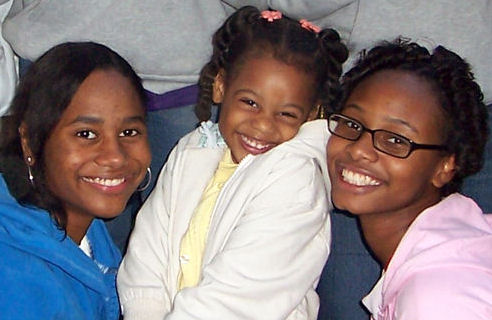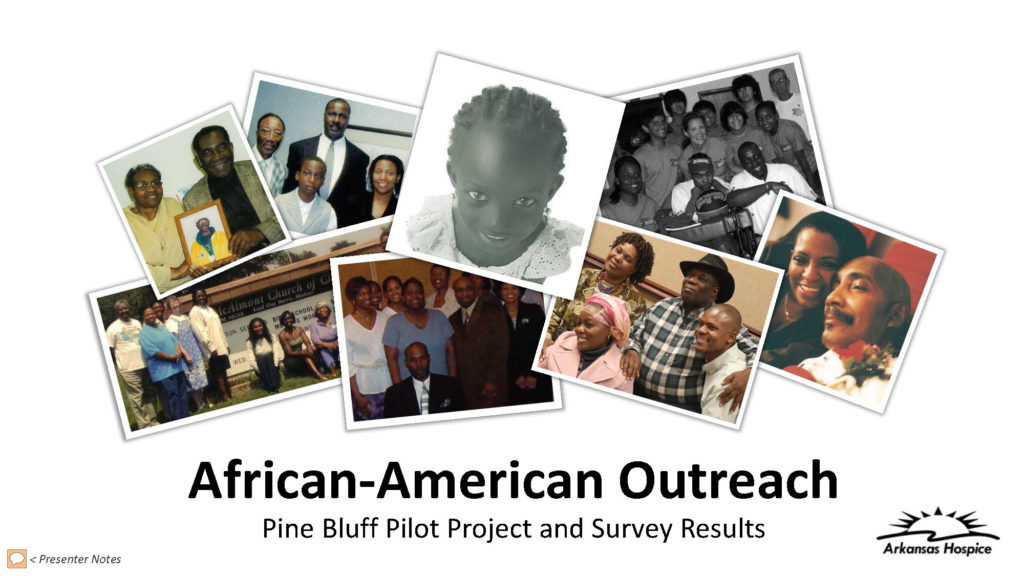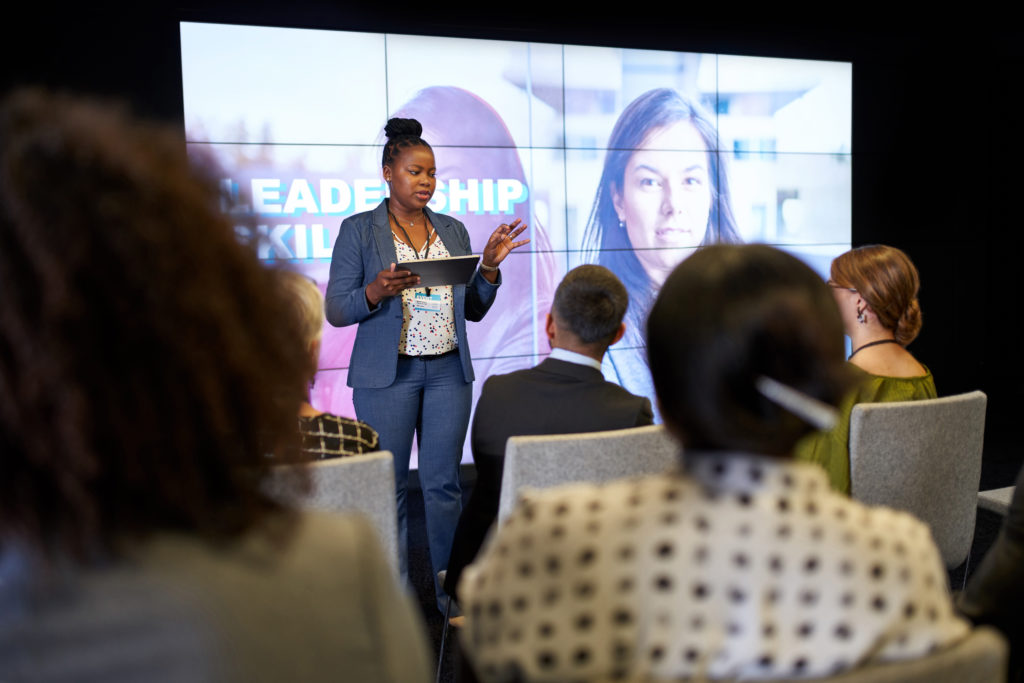By arhospice on March 5th, 2019
“African Americans and other minorities are at risk of not dying well.”
– Duke Divinity School Professor Richard Payne
Nationally and in Arkansas, too few African Americans benefit from hospice care. Black/African Americans account for 13.2% of the general population (US Census) but only 7.6% of the hospice patients in 2014 according to the National Hospice and Palliative Care Organization (NHPCO). You would expect these numbers to be nearly the same; instead we find a staggering 42% discrepancy. Compare this to White/Caucasians, who were 77.4% of the general population and 76% of hospice patients in 2014 – a discrepancy of less than 2%. Since 2010, 80% of hospice patients were White, but just 8% were Black. And sadly, the situation for African Americans has gotten worse in recent years, not better, declining from nearly 9% in 2010 to less than 8% in 2014.
Why?
A PBS report called “Unequal Treatment” asked the same question – take a look:
African Americans being under-served has an historical context with extensive social discrepancies that we must recognize for any hope to rectify them and realize equality. The Pew Research Center recently published a report declaring that Martin Luther King Jr.’s dream “remains an elusive goal,” with Black household income just 59% that of Whites, Black Americans nearly three times as likely as Whites to live in poverty with a median net worth of just 9% that of Whites, and home ownership at 73% for Caucasians but only 44% of African Americans. For each of these indicators and many others, conditions are worse for African Americans than any other racial ethnicity.
What about health care?
There are many sources and indicators to consider, but recent US Department of Health and Human Services National Healthcare Quality and Disparities Reports summarize the persistent situation well, noting: “Blacks received worse care than Whites for about 40% of measures, had worse access to care than Whites for 33% of core measures, and fewer than 20% of the disparities showed evidence of narrowing; all eight national health care priority areas [including Palliative and Hospice Care] showed disparities related to race, ethnicity, and socioeconomic status.”
A key factor behind these statistics, especially for health care, is trust. According to the Journal of Cultural Diversity, “The United States of America is often called the great melting pot because of its diverse population. As the diversity of this great nation continues to grow, so does the continuing problem of distrust of the traditional health care system. The more negative attitudes expressed by African Americans towards the nation’s health and social institutions are partially grounded in the circumstances and experiences that failed to eliminate historical racial disparities.”
What about hospice?
As the NHPCO explains: “Many African Americans remember the days of segregation, Jim Crow laws, and violence towards their people. Many African Americans are deeply distrustful of the government and the healthcare system, a distrust that is rooted in both historical and present day experiences…. So when African Americans do seek care for their health, particularly at the end-of-life, it is little wonder that many worry that hospice is just another way to hasten death.”
We appreciate how hard it can be to talk about serious illness, death, and dying, even under ideal circumstances. We address common misconceptions about hospice care every day, including many that prevail with many African Americans, such as believing that hospice is a “place” where you go to die, or that patients will be separated from their families or denied pain medicine, or that their faith beliefs will not be honored, or that it is too expensive or not covered by Medicare.
Is there good news?
Absolutely. In fact, our message is virtually all good news. Arkansas Hospice is a nonprofit, mission organization. Our one purpose is to serve seriously ill patients and their loved ones regardless of their race or ethnicity, gender, age, religion, sexual orientation, disability, income level, or even their ability to pay. Hospice is available to everyone and is usually covered by Medicaid or Medicare if not private insurers; but even for those who lack coverage and cannot pay, Arkansas Hospice still provides full services at no cost through our charitable Uncompensated Care program. Hospice does not hasten death; to the contrary, hospice has been shown not only to improve patients’ quality of life, but it can even increase life expectancy. Most hospice patients prefer to be at home, and that’s where most are served, surrounded by family, friends, faith leaders, church and community groups… whomever they choose. And when some patients are simply too ill to be cared for at home, Arkansas Hospice has inpatient centers that we try to make as much like home as possible for our patients and their loved ones, who are welcome to stay as long as they like.
How can we share the good news about hospice?

The short answer is, “with humility.” Even with open hearts, minds full of social studies, and the best intentions, we cannot know how you feel about these matters until we ask, and then pay close attention to your answers. Having established how many complicated and historical issues are involved, we accept that this will be a long-term effort and that we must undertake it for our mission, but also to do our part for social justice. That we have a role to play is not a burden; it is a blessing.
As Harlem Renaissance author Jean Toomer wrote, “We learn the rope of life by untying its knots.” There is much meaning in those few words. For one, it assumes a humble, righteous, and shared purpose – “we learn.” It also implies two operators, two ends, and something connecting them – connecting us. Finally, although the rope may be bound-up, knotted, or restricting when we find it, together we can manage it and use it as a way to climb free or share our burdens, carrying more than we’d imagined was possible, and doing what would be impossible without each other.
Our Pine Bluff Pilot Project
With funding help from our friends at the Arkansas Black Hall of Fame Foundation, the Ben J. Altheimer Charitable Foundation, and Pine Bluff Area Community Foundation, we implemented a pilot project from our Jefferson County-area office in Pine Bluff to help us improve our understanding and outreach to our African American communities in Arkansas. As part of our community outreach “on the ground,” we surveyed people’s thoughts and feelings locally, then sought responses more broadly to compare results.
Survey Results and Project Evaluation
We are happy to share the results of our Pine Bluff pilot project (in two formats) with every hope that our progress will continue and contribute to your efforts as well:

Document version of the presentation. Watch for speaker’s notes (word balloons) in the upper-left corner of certain slides that you can hover or click on or off.
Media version of the presentation. This version includes the slideshow
animations; just press the pause button on the player if the speed is too fast to read the content.
You’re also welcome to review the full, raw results of our survey question-by-question. If you have any thoughts or questions, please contact our Foundation Office for more information. Thank you so much for your interest and partnership on this important effort.
Can I help?
Yes, you can! Here are just a few ways, but also let us know your ideas for more:

We’re available for presentations on Diversity Equity and Inclusion, as well as Minority Outreach. CLICK HERE to schedule an event with our speaker’s bureau.


 Registered 501(c)(3). EIN:
Registered 501(c)(3). EIN: